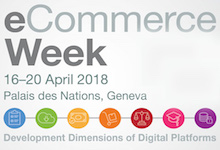An African digital structural transformation
16 Apr 2018 10:00h - 11:30h
Event report
[Read more session reports from the UNCTAD E-Commerce Week 2018]
The session was co-organised by the South African Permanent Mission to the World Trade Organization (WTO) and examined the challenges and opportunities related to trade policy and development in Africa. The discussions focused on the key elements that need to be taken into account for the development of digital industrial policies in order for Africa to achieve its own digital structural transformation. Mr Xavier Carim (Ambassador, South African Permanent Mission to the WTO in Geneva), welcomed the participants and pointed to the published work of some of the panellists.
The first panellist, Dr François Xavier Ngarambe (Permanent Representative, Mission of Rwanda to the UN and other International Organisations in Geneva), briefly spoke about the ‘African paradox’, recalling the abundance of resources and the young population of the continent and the large concentration of least developed countries. Among other factors, he identified weak governance, capacity, and capability structures as elements maintaining the status quo on the continent. For this reason, the heads of African states will soon launch the Continental Free Trade Area (CFTA), which will also include provisions for digital connectivity and transformation.
The ambassador further mentioned that the African group continues to explore whether existing WTO rules are sufficient to protect developing states and are looking into questions regarding free, cross-border data flows and taxation issues, considering that data is the new oil for the digital economy. Also, considering that we have now entered the age of e-commerce for digital services rather than physical goods, he asked which kinds of national policies are conductive for digital transformation and how technology transfer can best be organised.
Dr Laura Mann (Assistant Professor, London School of Economics and Political Science) focused her presentation on the challenges of domestic resource mobilisation in the digital age. She urged decision-makers to analyse whether policies facilitate the reinvestment of surpluses into local economies or whether they are extractive in nature. She also advised policy-makers not to focus on the creation of value alone, but rather, to consider the long-term benefits for local economies, for example by imposing stricter tax regulations. She questioned the practice of incubating start-up companies, whose inherent goal is to be bought by bigger firms. These firms in turn tend to extract rather than to produce value locally.
Mr Parminder Jeet Singh (Executive Director, IT for Change, Bangalore, India) stressed the importance of gaining a better understanding of digitalisation and how it differs from previous waves of industrialisation. Singh also underlined the importance for countries of the Global South to develop their own knowledge about digitalisation issues and that these countries should not solely rely on help from developed countries. In addition to that, he said that developing countries, in negotiating at the WTO, should insist more on the transfer of technology rather than data transfers in order to break down the digital divide.
Another important element, according to the speaker, is the need for collective rights to data and the protection of online platforms. Given that de-identified data or social behavioural data is much more powerful and threatening for countries, it should become a priority for countries to protect this kind of data, but this does not exclude data exchanges with foreign companies. Additionally, platforms that are the main sites for data collection should be domestically owned to ensure the protection of citizens.
Dr Shamel Azmeh (Assistant Professor, University of Bath in the UK) mentioned that automation will likely affect the development of global value chains that have led to the rapid development of certain Asian countries. He introduced the idea that 3D printing for example might lower production costs all the while reducing the distance between the location of the production and the consumption of a product. Azmeh also emphasised that African countries should identify and propose global digital regulations that are development friendly in multilateral agreements despite the trend for bilateral free trade agreements between rich nations.
Mr Richard Kozul-Wright (Director, Ddivision on Globalisation and Development Strategies, UNCTAD) mentioned three forces that needed to be taken into account with regards to e-commerce. First, he stated that Africa is a continent prematurely un-industrialised which makes future growth more challenging. Second, he identified the dominance of capital as a pervasive element, which challenges decision-making processes in both policy and business-related fields. Finally, he argued that international regulations are still largely influenced by the Washington consensus and the neo-liberal approach. In this context, the digital revolution has been added as a new factor shaping the future.
Given the tendency for data-driven business models to build monopolies and be extractive in nature, the speaker urged the African states to push for stronger infant industry protection regulations and take ownership of these platforms.
By Cedric Amon
Related topics
Related event

